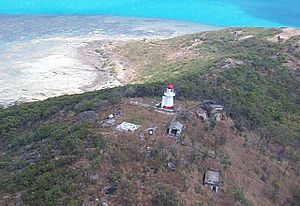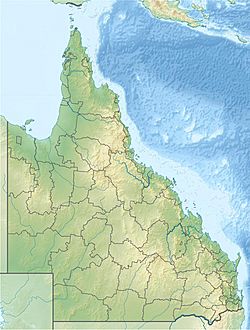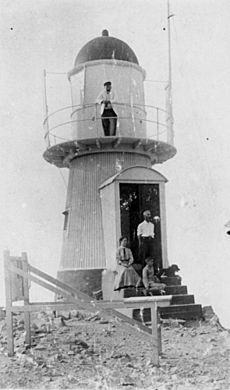Goods Island Light facts for kids
 |
|
| An aerial view of Goods Island Lightstation, 1999 | |
|
|
|
| Location | Goods Island Queensland Australia |
|---|---|
| Coordinates | 10°33′54.6″S 142°09′07.08″E / 10.565167°S 142.1519667°E |
| Year first constructed | 1886 |
| Automated | 1973 |
| Foundation | concrete tower |
| Construction | timber frame clad with corrugated iron |
| Tower shape | cylindrical tower with balcony and lantern |
| Markings / pattern | white tower, red lantern dome |
| Height | 18 feet (5.5 m) |
| Focal height | 345 feet (105 m) |
| Original lens | 4th Order dioptric |
| Range | 11 nautical miles (20 km; 13 mi) |
| Characteristic | Q W |
| Admiralty number | K3270.1 |
| NGA number | 111-9628 |
| ARLHS number | AUS-232 |
The Goods Island Light is a working lighthouse on Goods Island (also called Palilag). This island is part of the Torres Strait in Queensland, Australia. The lighthouse helps ships find their way into Normanby Sound. It acts like a special "rear light" in a pair of lights that guide boats safely.
Contents
A Guiding Light: Its Story
The very first navigation help on Goods Island was a signal station. It was set up in 1877. This station used flags or lights to send messages to ships.
Building the Lighthouse
In 1882, people who fished for pearls in the Torres Strait asked for a proper light. They needed a lighthouse to guide them safely. George Heath, who was in charge of the Queensland Marine Board, agreed. He chose Goods Island as the perfect spot.
A temporary light was first placed on the signalman's house. Then, in 1886, the real lighthouse was built. It was one of eight lighthouses in Queensland made from a hardwood frame. This frame was covered with corrugated iron. The Goods Island Light was special because government workers built it. Most other lighthouses were built by private companies. The original light inside used a special glass mirror to make the light bright.
Changes Over Time
In 1894, a telegraph line was set up. This allowed people at the lighthouse to send messages to Thursday Island. Later, when the different parts of Australia joined together to form the Commonwealth of Australia, the lighthouse became managed by the new national government.
During World War II, the Royal Australian Navy took over the island. They built defenses around it to protect the area.
In 1973, the lighthouse became "automated." This means machines took over the job of the lighthouse keepers. No one needed to live there anymore to operate the light. In 1988, it was changed to run on solar power. This uses energy from the sun to keep the light shining.
What the Lighthouse Looks Like
The Goods Island Light is about 18-foot (5.5 m) tall. It has a cone shape and is made of a hardwood frame. This frame is covered with white painted corrugated iron. On top, it has a red dome made of zinc. To get into the tower, you walk up concrete steps. There's also a small entryway made of corrugated iron.
Other Buildings Nearby
There is also a "front light" which is a smaller, white hut. It sits on a rock platform below the main lighthouse. The main lighthouse is about 505 meters away from this front light.
You can also find an old timber storage shed on the island. There's also a lighthouse keeper's cottage, which is now in ruins. Both of these buildings are white with green roofs.
How the Light Works
The main lighthouse shows a quick-flashing white light. This light can be seen from certain directions for about 11 nautical miles (20 km; 13 mi) (nautical miles).
The smaller front light flashes white and red every two and a half seconds. The red flashes can be seen for about 7 nautical miles (13 km; 8.1 mi). The white flashes can be seen for about 10 nautical miles (19 km; 12 mi). Sometimes, the front light's view is blocked by Hammond Island or even by Goods Island itself.
Visiting the Lighthouse
The Australian Maritime Safety Authority manages and operates the Goods Island Light. You can only reach the island by boat. However, the lighthouse and the area around it are not open to the public.
 | Selma Burke |
 | Pauline Powell Burns |
 | Frederick J. Brown |
 | Robert Blackburn |



